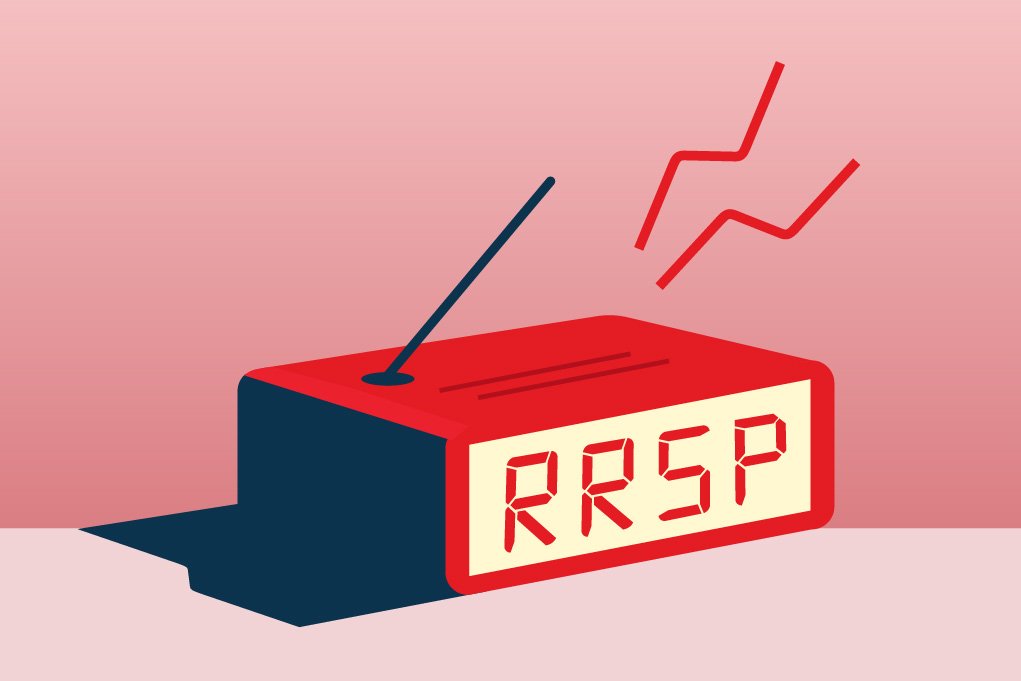It’s no surprise that RRSPs are so popular: whatever your age, contributing to an RRSP is one of the best strategies for paying less tax – and keeping more money for yourself!
The amount you invest in your RRSP allows you to reduce your taxable income, whether in the year of your contribution or in a future year.
Since the tax rate in Canada is progressive (higher incomes are taxed more), you can reduce your taxable income during your working life by contributing to an RRSP. You won’t pay tax on contributions until you withdraw them, and since this generally happens in retirement when your income is lower, your tax rate will be too.
In a nutshell: RRSPs help you pay less tax today... and pay less tax in the future!
How much can you contribute to your RRSP?
Each year, you’re entitled to contribute up to 18% of your income, or the annual limit for the current year, to your RRSP.
Keep in mind that unused contribution room can be carried forward indefinitely and added to contributions for future years. This means you can further reduce your taxable income and benefit from even greater tax savings. With tax advantages like these, you could even consider taking out an RRSP loan to maximize your contribution.
→ See our page on RRSP contributions to determine your contribution limit.
When can you contribute to your RRSP?
For your contribution to be eligible, you can contribute to your RRSP throughout the tax year and in the first 60 days of the year in which you file your tax return.
What are the other advantages of an RRSP?
If retirement feels a long way off, don’t forget that your RRSP can also help you:
1. Buy a house
The Home Buyers’ Plan (HBP) allows you to withdraw up to $60,000 from your RRSP without any tax penalties.
Good to know: If you’re saving to buy your first home, you can also open an FHSA. You can make tax-deductible contributions of up to $8,000 per year for a lifetime maximum of $40,000. Unlike the HBP, you won’t have to repay the funds withdrawn from your FHSA.
→ Check out our article on the FHSA to learn more.
2. Go back to school
With the Lifelong Learning Plan (LLP), you can withdraw up to $20,000 from your RRSP to finance your studies.
How much can you save in taxes with an RRSP? Here are four concrete examples.
Sophia
23 year old
Graphique Designer
Annual income: $35,000
Incom tax payable: $6,287
Her RRSP Strategy: Sophia dreams of traveling; yet, she managed to set aside $1,000 for her RRSP this year.
Tax payable
(after RRSP
deduction): $6,001
Tax savings as result of the RRSP: $286

Chris
34 years old
Mailman
Incom tax payable: $46,000
Impôt à payer : $9,727
His RRSP Strategy: Every week, Chris automatically pays $75 into his RRSP, accumulating an annual RRSP contribution of $3,900.
Tax payable
(after RRSP
deduction): $8,354
Tax savings as result of the RRSP: $1,373

Gwen
32 years old
Engineer
Incom tax payable: $20,491
Her RRSP Strategy: This year, Gwen got a job that pays her much a higher than she earned before. In order to reduce the amunt of tax payable, it was worth it for her to get a $20,000 RRSP loan, repayable over three years. She was able to do this because she still had unused RRSP contribution room. She will therefore be able to use the amount of tax saved to pay back a portion of her loan and distribute the remaining balance with monthly payments.
Tax payable
(after RRSP
deduction): $13,067
Tax savings as result of the RRSP: $7,424

Peter
25 years old
Accounting clerk
Annual income: $35,000
Incom tax payable: $6,287
His RRSP Strategy: Peter is careful with his money and managed to set aside 18% of his annual salary ($6,300) to contribute to his first RRSP.
Tax payable
(after RRSP
deduction): $4,490
Tax savings as result of the RRSP: $1,797

For more tips and advice on managing your personal finances, sign up for the National Bank newsletter.
